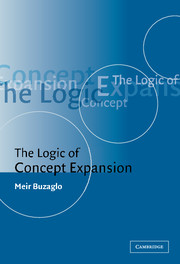Book contents
- Frontmatter
- Contents
- Preface
- Acknowledgments
- Introduction
- 1 Historical background
- 2 Frege's opposition
- 3 The grammar of constraints
- 4 Expansions as rational procedures
- 5 Implications for concepts
- 6 From words to objects
- 7 Gödel's argument
- 8 Implications for thoughts
- 9 “I was led astray by language”
- Epilogue: How do we go on from here?
- References
- Index
Epilogue: How do we go on from here?
Published online by Cambridge University Press: 22 September 2009
- Frontmatter
- Contents
- Preface
- Acknowledgments
- Introduction
- 1 Historical background
- 2 Frege's opposition
- 3 The grammar of constraints
- 4 Expansions as rational procedures
- 5 Implications for concepts
- 6 From words to objects
- 7 Gödel's argument
- 8 Implications for thoughts
- 9 “I was led astray by language”
- Epilogue: How do we go on from here?
- References
- Index
Summary
In this book I have analyzed a certain type of expansion of concepts – non-arbitrary changes of extension – and investigated some implications for the philosophy of language and of mathematics. I hope that I have managed to prove my central claim about the importance of the phenomenon of expansions to fundamental questions in mathematics and logic. But I am far from believing the interest in this phenomenon is exhausted in this book. In fact, since my interest here was to present forced expansions, and their relevance to important questions that have been discussed in philosophy since Frege, I have not exhausted the subjects discussed in the previous nine chapters. Instead of summarizing what I have presented so far, I wish to illustrate the directions in which the phenomenon of conceptual change should be researched.
I present the simplest issues first and work my way up to the more difficult ones.
A. Modern logic, founded by Frege, gives us no tools for understanding concept development, for it forces us to claim of the developed concept that either it is identical to the old one or it is completely different from it. When we get to philosophy, we feel that this sharp division is insufficient to get to the bottom of the problem, but dealing with a specific problem of this sort does not let us return to logic, or to simpler situations and to see what happens there. The first cluster of questions I propose is to take examples of expansions from mathematics and science, preferably as simple as possible, and to analyze them. Thus, removed from the heat of the philosophical debate we are discussing, we can see what is happening in a clearer way.
- Type
- Chapter
- Information
- The Logic of Concept Expansion , pp. 169 - 174Publisher: Cambridge University PressPrint publication year: 2001



